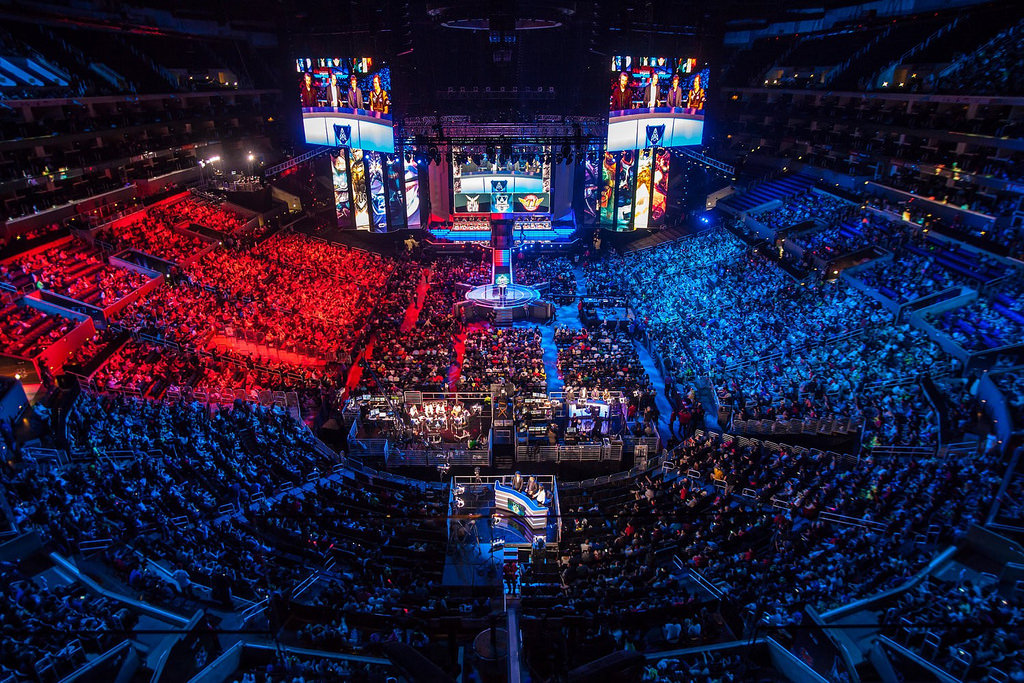
15 May eSports – the beginnings and today
With eSports set to reach a global audience of 380 million this year and on the track to become a billion-dollar industry by 2020, the competitive gaming phenomenon is shaking up the entertainment industry. This is a brief look into the beginnings of professional gaming, and the most recent developments as eSports crosses into the mainstream.
Gaming is now serious business, and there’s no denying that. While a career in professional gaming might have seemed like a joke in the previous decade, it has become a much more grounded possibility, as the eSports phenomenon has exploded in popularity during the past few years. Tournaments attract online viewers in the millions, and devoted fans travel around the world for a chance to see their favourite teams play in person. Various organisations are beginning to see how eSports is beginning to disrupt and rival real-life sports, with ESPN launching their own dedicated section for competitive gaming, and bookies taking bets on Counter-Strike matches just as they would for the Premier League.
Though eSports as a concept is still fresh in our memories, the beginnings of competitive gaming go all the way back to 1972. In a year when the general public were likely to be unfamiliar with even the concept of a ‘video game’, Stanford University in California hosted a tournament for the game Spacewar!, with the grand prize being a year’s subscription to Rolling Stone. The event was put together by a writer for the magazine, Stewart Brand, who was working on a feature on how computers could have the power to “unleash creativity and change society.” While the coining of the term was still far away, it could be said that Brand captured the very first eSports event well over four decades ago.
A much larger tournament was hosted by Atari in November, 1980. Their Space Invaders event attracted 10,000 competitors, in stark contrast to a few students playing among themselves. Further on, in the 1990s, with the emerging popularity of first-person shooters, tournaments started becoming commonplace and offered much greater prizes than a magazine subscription. The Red Annihilation tournament for the first-person shooter Quake in 1997 is sometimes said to be the beginning of modern eSports. Indeed, the winner, Dennis Fong, is listed by Guinness World Records as the world’s first professional gamer. This time round, however, the stakes were much higher. Fong’s victory was awarded by him being able to drive away the grand prize – the Ferrari convertible that had belonged to the lead developer of the game, John Carmack.
Fast forward to the present day, and the medium is aiming at a more lofty goal than a sports car. While many would strongly disagree that eSports is, in fact, actually a ‘sport’, there is a growing movement for competitive gaming to achieve that status. In 2013, a professional League of Legends player was the first amongst eSports pros to receive an American P-1A visa, which is in the category for “internationally recognised athletes.” This set a precedent, and many pro gamers were awarded P-1A visas in the following years.
Currently, various athletic competitions are debating on the inclusion of eSports as a main event. The Asian Games will be including eSports as a demonstration event in the 2018 Games, and as a full-fledged medal event during the following Games in 2022. Some would argue that the lack of athleticism in eSports should preclude it from being included in major sporting events, but eSports would be far from the only non-athletic event in such a competition. As a part of a move to broaden the appeal of the Olympic Games to younger viewers, there are talks of the Paris Games in 2024 considering eSports for the medal event lineup.
With an ever-growing audience, eSports continues it’s meteoric rise in entertainment. The soon-to-be billion dollar industry shows no signs of slowing down, and with the newfound legitimacy from the recognition by major athletic competitions, the future seems bright for the 21st century sports powerhouse.

